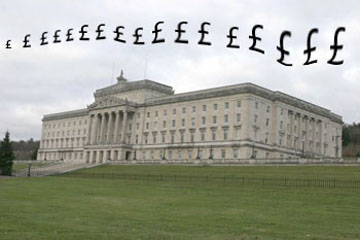Business organisations are wringing their hands as Stormont looks set to collapse following the RHI row.

Commenting this afternoon Northern Ireland Independent Retail Trade Association (NIIRTA) Chief Executive Glyn Roberts said: “This situation is very concerning as political instability is neither good for business nor the economy”
“Big issues need to tackled such as Brexit, Business Rate Reform, Corporation Tax, Investment in Skills and modernisation of our Infrastructure which are all vital for the future of our local economy.
‘If an Assembly Election is to be called, we hope that it is done sooner rather than later to ensure a new Administration is in place at the earliest opportunity to tackle these key challenges.
“However, an Election is not going to fix the problems around the RHI scheme.
“We need to see real leadership from all the political parties to see us through this crisis.”

And the Federation of Small Businesses said that the political stalemate needs addressing to encourage investment intentions.
The investment intentions of small businesses remain subdued and have fallen compared to last year, with costs of doing business continuing to rise, according to research published today by FSB, the largest business organisation.
The FSB’s Small Business Index (SBI) for Q4 2016 highlights that overall in the UK, business confidence has increased to pre-EU Referendum levels, after a decline was recorded in Q3. However, the share of small businesses aspiring to grow over the next 12 months has fallen, with a significant increase in those expecting to stay the same size (37.5% compared with 27.4% in Q2, 2015).
In order to redress concerns around low investment intentions, FSB Northern Ireland has emphasised the need for political stability.
 Wilfred Mitchell OBE, FSB Northern Ireland Policy Chair, said: “Our research, undertaken in partnership with the Ulster Business School in 2015, revealed that the top two concerns amongst SMEs were political instability and economic stagnation. A quarter of local small businesses cited these as the primary restrictions on their ambitions for growth.
Wilfred Mitchell OBE, FSB Northern Ireland Policy Chair, said: “Our research, undertaken in partnership with the Ulster Business School in 2015, revealed that the top two concerns amongst SMEs were political instability and economic stagnation. A quarter of local small businesses cited these as the primary restrictions on their ambitions for growth.
“With ongoing uncertainty over the stability of the Northern Ireland Executive, the fears of our members are increased around issues such as economic stagnation, increased taxes and limited access to finance as well as the daily business of Stormont coming to a halt.”
Mr Mitchell added: “The Assembly and Executive need to enable conditions for stability and growth to protect and promote the local economy and encourage competition with the rest of the UK, through promoting the interests of the largest contributors to employment, GVA and turnover – small businesses.”
Nationally, the Bank of England keeps a close watch on spare capacity and for Q4, the number of businesses operating below capacity fell to 44.2 per cent. This supports the case for leaving interest rates on hold for now as more small firms are expanding operations and boosting their workforce.
FSB’s quarterly report highlights that there are areas of strong performance, however most small firms are not seeing this feeding through to profits. Profitability has dropped for the second quarter in a row. In particular, there has been a dramatic increase in the number of firms citing the exchange rate as the main cause of cost inflation, currently at 28 per cent, compared to just 5.4 per cent a year earlier, as the pound remains at consistently lower levels against other major currencies.
Mr Mitchell concluded: “Our members still face many challenges as rising costs squeeze margins even further. The falling pound is driving up the price of imports and rising oil prices are being reflected in higher fuel costs. These inflationary pressures and price competition are hitting the bottom line hard with the majority of small firms seeing their profits continue to fall.
“But with costs rising, our members throughout the UK will need support for their confidence to translate into new economic growth and jobs. As policy makers prepare for Brexit negotiations and look to small firms to contribute to the UK’s economic success, we would urge them to be ready to act if trading conditions deteriorate. We call on the Chancellor to make the 8th March a full-throated pro-business Budget.”
























